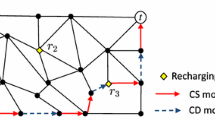Abstract
Plug-in hybrid (PH) buses offer range and operating flexibility of buses with conventional internal combustion engines with environmental. However, when they are frequently charged, they also enable societal benefits (emissions- and noise-related) associated with electric buses. Thanks to geofencing, pure electric drive of PH buses can be assigned to specific locations via a back-office system. As a result, PH buses not only can fulfil zero-emission (ZE) zones set by city authorities, but they can also minimize total energy use thanks to selection of locations favouring (from energy perspective) electric drive. Such a location-controlled behaviour allows executing targeted air quality improvement and noise reduction strategies as well reducing energy consumption. However, current ZE zone assignment strategies used by PH buses are static—they are based on the first-come-first serve rule and do not consider traffic conditions. In this article, we propose a novel recommendation system, based on artificial intelligence, that allows PH buses operating efficiently in a dynamic environment, making the best use of the available resources so that emission- and noise-pollution levels are minimized.
Access this chapter
Tax calculation will be finalised at checkout
Purchases are for personal use only
Similar content being viewed by others
References
Alba, E., Dorronsoro, B.: Cellular Genetic Algorithms. Springer, Boston (2008). https://doi.org/10.1007/978-0-387-77610-1
Arvidsson, R., Storsater, A.D.: Geofencing as an enabler for zero-emission zones. In: 25th ITS World Congress (2018)
Auge, O.: Keynote 2: TOSA concept: a full electric large capacity urban bus system. In: 17th European Conference on Power Electronics and Applications (2015)
Chollet, F., et al.: Keras (2015). https://keras.io
Fortin, F.A., De Rainville, F.M., Gardner, M.A., Parizeau, M., Gagné, C.: DEAP: evolutionary algorithms made easy. J. Mach. Learn. Res. 13, 2171–2175 (2012)
Gallo, J.B., Bloch-Rubin, T., Tomific, J.: Peak demand charges and electric transit buses. Technical report, U.S. Department of Transportation (2014)
Goldberg, D.E.: Genetic Algorithms in Search, Optimization and Machine Learning. Addison-Wesley Longman Publishing Co. Inc., Boston (1989)
He, H., Yan, M., Sun, C., Peng, J., Li, M., Jia, H.: Predictive air-conditioner control for electric buses with passenger amount variation forecast. Appl. Energy 227, 249–261 (2018). Transformative Innovations for a Sustainable Future - Part III
Holland, J.H.: Adaptation in Natural and Artificial Systems. University of Michigan Press, Ann Arbor (1975)
Karayiannis, N., Venetsanopoulos, A.N.: Artificial Neural Networks: Learning Algorithms, Performance Evaluation, and Applications. Springer, Boston (1993). https://doi.org/10.1007/978-1-4757-4547-4
Li, L., Zhang, Y., Yang, C., Yan, B., Martinez, C.: Model predictive control-based efficient energy recovery control strategy for regenerative braking system of hybrid electric bus. Energy Convers. Manag. 111, 299–314 (2016)
Peng, J., He, H., Xiong, R.: Rule based energy management strategy for a series parallel plug-in hybrid electric bus optimized by dynamic programming. Appl. Energy 85(Part 2), 1633–1643 (2017)
Pternea, M., Kepaptsoglou, K., Karlaftis, M.: Sustainable urban transit network design. Transp. Res. Part A Policy Pract. 77, 276–291 (2015)
Ranganathan, S.: Hybrid buses costs ad benefits. Technical report, Environmental and Energy Study Institute, Washington, DC (2007)
Rogge, M., Wollny, S., Sauer, D.U.: Fast charging battery buses for the electrification of urban public transport-a feasibility study focusing on charging infrastructure. Energies 8(5), 4587–4606 (2015)
Seredynski, M., Viti, F.: Novel C-ITS support for electric buses with opportunity charging. In: Conference on Intelligent Transportation Systems (ITSC), pp. 1–6 (2017)
Seredynski, M., Viti, F.: Towards dynamic zero emission zone management for plug-in hybrid buses. In: 26th ITS World Congress (2019)
Seredynski, M.: Targeted air quality improvement via management of zero emission zones of plug-in hybrid buses. In: 25th ITS World Congress (2018)
Acknowledgements
The authors would like to acknowledge the Spanish Ministerio de Economía, Industria y Competitividad and ERDF for the support provided under contracts RTI2018-100754-B-I00 (iSUN project) and FPU17/00563. This work was partially funded by the University of Cadiz (contracts PR2018-056 & PR2018-062).
Author information
Authors and Affiliations
Corresponding author
Editor information
Editors and Affiliations
Rights and permissions
Copyright information
© 2020 Springer Nature Switzerland AG
About this paper
Cite this paper
Ruiz, P., Arias, A., Massobrio, R., de la Torre, J.C., Seredynski, M., Dorronsoro, B. (2020). Intelligent Electric Drive Management for Plug-in Hybrid Buses. In: Dorronsoro, B., Ruiz, P., de la Torre, J., Urda, D., Talbi, EG. (eds) Optimization and Learning. OLA 2020. Communications in Computer and Information Science, vol 1173. Springer, Cham. https://doi.org/10.1007/978-3-030-41913-4_8
Download citation
DOI: https://doi.org/10.1007/978-3-030-41913-4_8
Published:
Publisher Name: Springer, Cham
Print ISBN: 978-3-030-41912-7
Online ISBN: 978-3-030-41913-4
eBook Packages: Computer ScienceComputer Science (R0)




